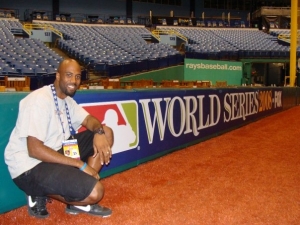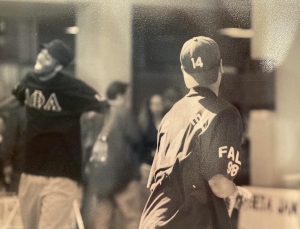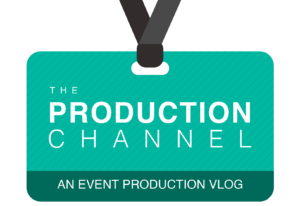Going Back to Go Forward
By Cosette Strong
In this edition of our interview feature series conducted monthly across a virtual platform, I will give you a window into chats with Clem as he shares his thoughts about a number of things, namely 2020s impact on his industry of Live Event Production and where we need to go from here. This interview took place via a virtual video chat while I was in Pickerington, Ohio, and Clem was in St. Petersburg, Florida.
Cosette: Last month we talked about 2020 – its impact, its chaos and its disruption. That CTRL + ALT + DEL that paralyzed some people but compelled you to progress. Speaking of progress, let’s talk about how we humans progress, and most notably, your pattern for progress. Sometimes in order to go forward, we have to go back. What does that mean to you?
Clem: [pauses and looks at the blue, cloudless sky] Well, with the industry, life halted. Everything just stopped. One day there was a game… an event… a concert… and then the next day there was nothing. It was cancelled. Then another and another and another. Cancelled. Gone.
There was the hope we would hold onto something… the hope of future events, but then those, too, were cancelled. We experienced exponential growth and progress in 2018 and 2019, but then the pandemic happened and we were forced to take a beat, a pause, and for some a step back.
[FLASHBACK | March 2020:
I was preparing for a number of things: an epic birthday trip with my daughter, an immersive training production that I helped design and support as Production Manager, and several opportunities to work with clients doing purpose-driven work that motivated and inspired me. There was so much I was looking forward to. Like many others, I was expecting an amazing 2020. Like many others, COVID-19 was not something I expected. It was challenging to adjust professionally and personally. There was no precedent, no project plan, no blueprint or template to follow to navigate through the challenges the pandemic brought.
Cosette: OK… but didn’t that occur with many industries, and certainly to a lot of people? How does what you’re saying relate not only to the pandemic at-large but also narrows focus to independent contractors aligned with your industry in particular?
Clem: [looks at the sky, considering] So… sometimes it’s not always a pandemic – it can be any situation that impacts your life. Maybe it’s an injury, a death, a relocation, a birth, a new whatever it is that affects the way you once did things. That affects the way you once did life.
Through that transition and that adjustment period, you have to understand what it took for you to make it to that point in life in the first place. What it took for you to be that “successful”. Now, that beat, that pause, that step back is your moment to reflect, analyze, and understand how you reached your peak performance level, and what it is about your true skill, your true sense of self, your holistic you that allowed for that growth to happen. You have to understand it, so you can repeat it. You have to believe in your true self’s ability to achieve the greatness you know you’re destined for.
Cosette: But preparing for 2020 – for the pandemic and the way everything just stopped – can we agree that no one could have prepared for that?
Clem: [laughs] Yeah… Of course… planning for a pandemic is something only a select few would prepare for. Those people probably have a fallout shelter or bunker somewhere overflowing with food and supplies. [laughs again] But seriously – there are ways that you can try to be ready for whatever’s coming, for whatever’s next around the corner. You have to understand the skills you possess as an individual – what makes you unique. Not the technical skills – but the life skills. [Clem leans in and looks at me, his face animated] What life skills do you possess that allowed you to get to this point, Cosette? Seriously!! Think about it! You need to understand the type of intangible equipment/tools you needed to be this successful. But, like I said, it’s not technical. It’s not the equipment – it’s YOU.
It’s your understanding around how to navigate the equipment, your understanding around how to navigate the stress, and your understanding around how to navigate client expectations.
Once you understand that – the root of who you are, you can take that skill, that understanding and transfer it to whatever else it is you’re meant to do next in life.
[FLASHBACK | April 2020:
As I consumed news media, talked to colleagues, clients and friends and absorbed the shock waves COVID-19 was sending out worldwide, it leveled me for a bit. The world was paused. Everything had come to a stop. Like many, I was trying to manage my health and well-being and part of the churn in me was because I wasn’t sure what to do next. What I did know is I couldn’t stay stagnant. I knew that if I did, it would not turn out well. I knew that making progress in the face of seemingly insurmountable challenges was a must. Deciding to obtain my Coaching certification was my way of leaning into the intangible attributes that make me who I am and was also a way for me to navigate my surroundings in a meaningful and productive way.
Cosette: [nods slowly] So… in going back to go forward – it’s about the basics. Understanding what you bring to the table will help you move forward in a significant way.
Clem: Exactly. So in what feels like a step back, it’s really just a settle. Think about baseball. I spent many years shooting MLB games for the Tampa Bay Rays, and even worked their 2008 World S eries run against the Philadelphia Phillies. Before a batter hits that home run, he sees, observes and watches the ball heading towards him. He knows it’s coming, but then, what looks like a straight pitch takes a hard curve to the left. What does the batter do? He analyzes things, adjusts to the new obstacle, lifts the bat further off his shoulders, pulls it back, then gives it all he’s got to knock that ball out of the park. He took a beat and went backwards to go exponentially forward. Right?
eries run against the Philadelphia Phillies. Before a batter hits that home run, he sees, observes and watches the ball heading towards him. He knows it’s coming, but then, what looks like a straight pitch takes a hard curve to the left. What does the batter do? He analyzes things, adjusts to the new obstacle, lifts the bat further off his shoulders, pulls it back, then gives it all he’s got to knock that ball out of the park. He took a beat and went backwards to go exponentially forward. Right?
If in your own life, you take one step back but two steps forward, aren’t you still moving forward?
Cosette: Interesting. I agree with you – forward progress, no matter how big or how small, is movement. So, going back to thinking about the pandemic – what do you say to the independent contractor who feels like the little progress being made isn’t enough?
Clem: I’d tell them about my time in college, and when I joined my fraternity. I became a part of a brotherhood that changed the trajectory of my life. There was a step we would do called the Ape Walk. It was done in either a line or a circle.
[Clem’s eyes become wistful and his voice becomes nostalgic.]
Two steps forward one step back
Two steps forward one step back
Each brother had a unique and individual way of adding flair or flavor to their step, their process, and their way of life. Through our movements there was an undeniable rhythm, a heartbeat we, as members, felt.
When people watched us do this step at parties, step shows, or in the student union, they learned that, as an outsider, you don’t break the line or the circle.
Once we started you were either stuck on the inside or on the outside, and you were there until it was done.
An important lesson I learned was that as Mic Checka Remix was playing and the brothers were stepping, we were moving together and flowing together. There was no stopping us.
Cosette: And how do we relate that to independent contractors?
Clem: From an industry standpoint, we were all forced to take that beat together – we were forced to stop, to pause together. But then we had to pick up and understand we’re still moving – maybe not at the pace we were used to or accustomed to – but we’re still moving.
The point is, each brother stayed connected. And that’s what needs to be done now.
As independent contractors, it starts with putting our hand on our brother or sister’s shoulder, letting them know you’re there, and letting them know you’ve got their back. It has to start with staying connected and finding that inspiration so no one loses touch and falls to the wayside. We have to think as we did when we were on the road doing shows. We have to be exceptional. We have to accept that WE were exceptional. We have to make the impossible possible. We have to believe that through hard work and perseverance, we could do anything. We did it then, and we can do it NOW!
Now is the time to believe. Now is the time to create. Now is the time to execute. See it…Believe it… Achieve it! #Projection101
Two steps forward. One step back. Sometimes forward progress means backward movement. Sometimes, we have to accept that is what’s best so that we can move to what’s next. Look for my next connection point with Clem, as we talk about how having an agile business model so you can pivot in the face of challenges is essential to continuing on a forward path.




